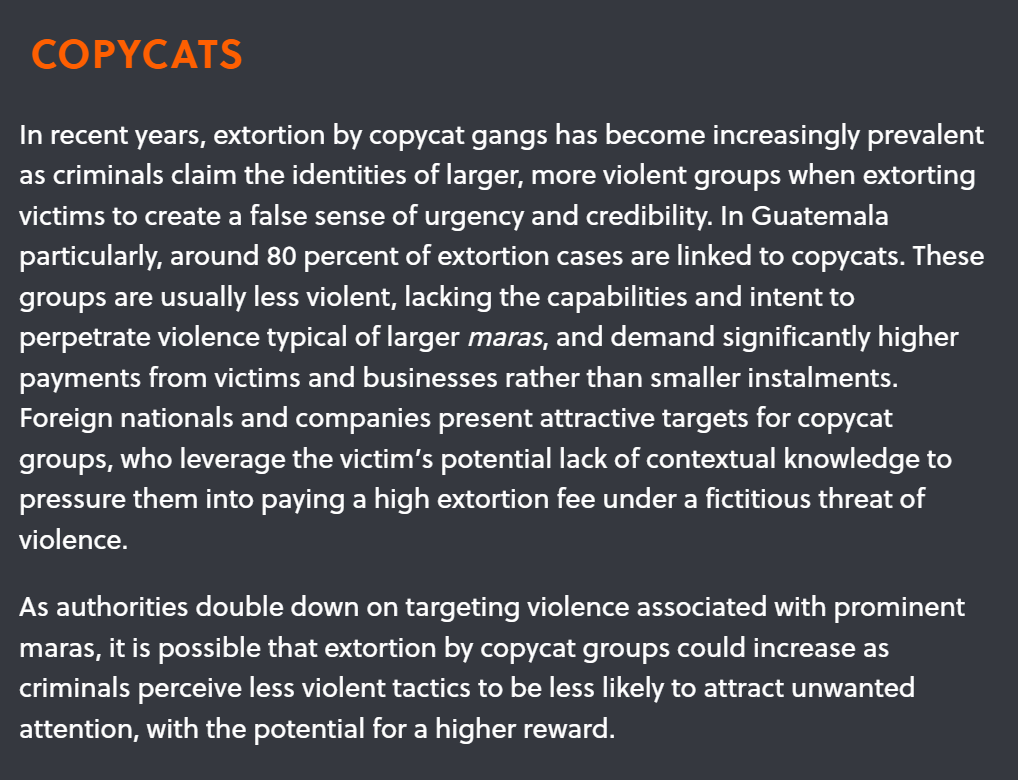The Bukele effect: Shifting extortion trends in Central America and Mexico
In Central America, particularly in the Northern Triangle including El Salvador, Honduras and Guatemala, extortion is one of the most prevalent manifestations of organised crime, and a source of recurring income for maras (street gangs) like Barrio 18 and Mara Salvatrucha 13 (MS-13). El Salvador has historically been a hotspot for extortion in the region, but President Nayib Bukele’s crackdown on gang violence under his ‘mano duro’ (‘iron fist’) strategy has, according to the government and local accounts, driven incidents down by 80 percent since a national state of exception was imposed in March 2022. But the crackdown has led to severely overcrowded prisons, and has sent thousands of remaining gang members fleeing into neighbouring countries like Honduras, Guatemala and Mexico, prompting concern among authorities that gangs will seek to establish or grow local footholds in these areas.
SHIFTING HOTSPOTS?
Maras have leveraged the flow of migrants fleeing violence in El Salvador (and insecurity in Haiti) to cross borders undetected, evade capture, and exploit vulnerable populations. Authorities in the region have increasingly attributed escalations in certain extortion activities, especially in the transport sector and against small- to medium-sized businesses, to these dynamics.
![]() Mexico
Mexico
In southern Mexico, towns around Tapachula, located in Chiapas State near the Mexico-Guatemala border, have experienced an escalation in violent extortion by Barrio 18 and MS-13 members over the past year. In line with these gangs’ traditional targets, this has largely been reported in the transport sector. Drivers have been killed and kidnapped for refusing to pay demands, prompting security forces to deploy over 300 personnel
to transport hubs.
![]() Honduras
Honduras
In Honduras, the government of Xiomara Castro has battled rising extortion and associated violence perpetrated mainly by MS-13. The government declared a state of emergency in at least 160 neighbourhoods in Tegucigalpa and San Pedro Sula in November 2022 in response to high levels of widespread extortion – also prevalent in the transport sector – and announced plans to increase the security presence at borders to prevent gang members entering the country. In May 2023 the state of emergency was extended until early July.
![]() Guatemala
Guatemala
Extortion has increased in Guatemala, where security forces have ramped up arrests of Barrio 18 and other gang members, including in Guatemala City, San José Pinula, Mixco and Santa Rosa. In 2023, authorities have reported an uptick in the number of deaths associated with extortion.
NETWORKING OPPORTUNITIES
Most of Latin America’s extortion calls originate in prisons, where gang members operate sophisticated extortion rackets and coordinate with associates on the outside to collect payments. El Salvador’s crackdown has seen over 60,000 gang members – amounting to approximately two percent of the country’s adult population – detained since early 2022, driving up the prison population, and the number of gang members available to perpetrate telephonic or online extortion. As governments like Honduras move to arrest gang members, this could generate further opportunities for individuals to join maras and engage in extortion.

OUTLOOK
While Barrio 18, MS-13 and other gangs have maintained a presence throughout Central America and Mexico for decades, recent developments and arrests of prominent figures emphasise these groups’ high levels of mobility and existing capabilities to operate transnational extortion networks. As the crackdowns in El Salvador – and more recently, albeit to a lesser extent, Honduras – continue, more gang members will likely enter prisons or seek to move to locations where the security environment is more permissive. This could reinforce extortion networks and boost gangs’ capabilities to carry out extortive practices against individual and commercial targets in the coming year.
